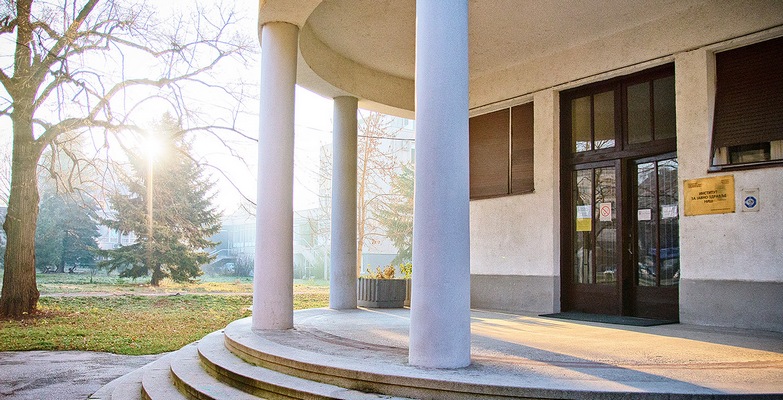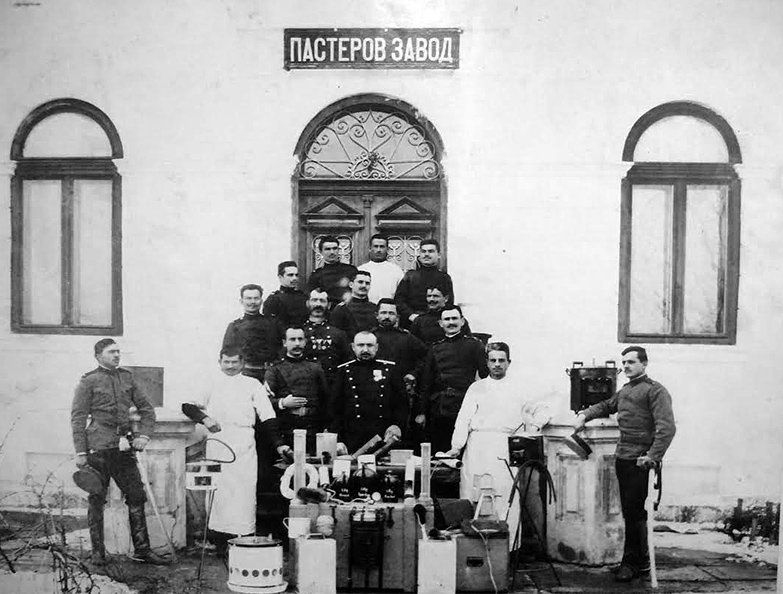Public Health Institute Niš is the oldest preventive health care medical institution in the Balkans.
The Institute performs activities within the areas of social medicine, hygiene, epidemiology and microbiology according to the state tasks and programs of the Republic of Serbia.
The Institute's activities cover the Niš and Toplica regions.

Public Health Institute Niš has received the quality system certificate from TUV SUD (register number of certificate 12 100 39069 TMS), and has achieved the ISO 9001:2008 certificate. The Accreditation Board of Serbia, Belgrade awarded the accreditation certificate (accreditation number 01-142) confirming that the Center of Hygiene and human ecology of the Public Health Institute Niš fulfills the requirements SRPS ISO-IEC 17025:2006 and is competent to perform testing as specified in the scope of accreditation.
About us

Public Health Institute Niš is the oldest preventive health care institution in the Balkans, founded in 1900. Throughout its long history, the name and scope of this institution was changed, but from its inception, the Institute always focused on protecting and improving the health of the population of southeastern Serbia.
Today, the Public Health Institute Niš, as the part of the Serbian network of public health institutes, represents a serious professional, research and educational national public health institution. The mission and vision of the Institute are well compliant with the current national legislation, as well as with the European and international guidelines.
The structural characteristics and the functioning of the public health institutes in Serbia are regulated by a separate Law on Public Health adopted in 2009, by the basic laws and their amendments (the Health Care Law and the Health Insurance Law), and also by a set of about 32 legislative acts primarily relating to other areas.
Vision and Mission
The vision for Public Health Insitute Niš is to become a leading national and regional institution dedicated to the application and translation of science, practice and promotion of public health with aim to improve community and national health by developing interdisciplinary and multi-sector activities in the public health system.
The mission of the Public Health Insitute Niš is to integrate diverse public health activities into achieving good health benefits for the population of Nisava and Toplica district, at first place, as well as in other parts of Serbia. In order to fulfil its mission and vision, the Public Health Institute Niš is developing:
- Interdisciplinary approach
- Multiprofessional approach
- National and regional cooperation, and
- Ethical orientation.
(pdf document)
Quality management system

Public Health Institute Niš has received the quality system certificate from TUV SUD (register number of certificate 12 100 39069 TMS), and has achieved the ISO 9001:2008 certificate. The Accreditation Board of Serbia, Belgrade awarded the accreditation certificate (accreditation number 01-142) confirming that the Center of Hygiene and human ecology of the Public Health Institute Niš fulfills the requirements SRPS ISO-IEC 17025:2006 and is competent to perform testing as specified in the scope of accreditation. The accreditation provides recognition of regulated reliability, independence and impartiality of analyses and results performed at the Institute. This ensures comparability of results with other countries, the international recognition of the Institute’s competence, high quality and transparency of its services. The objectives for the improvement of the quality of plans and work quality include: improving customer satisfaction through a "client-oriented approach"; improvement of employee satisfaction, improving the working conditions in all organizational units; maintenance of meeting the requirements of ISO 9001:2008 throughout the institution and in the ISO IEC 17025 in the accredited center; continuous increase of the realization of the activities and tasks for the market. The National Reference Laboratory for Campylobacter and Helicobacter was established at the Public Health Institute Niš. It collaborates with other reference laboratorios within the scope of the Institute’s accreditation and participate in the validation of control methods.
History of the Public Health Institute Niš

The Royal Pasteur Institute started its work in Niš, under military management, in separate building, as the first preventive care institution in the Balkans in June 1900, (only ten years after the founding of the Pasteur Institute in Paris). It was established visionary in order to involve local experts to start production of animal lymph, and to treat people bitten by rabid animals, using vaccines produced in local conditions. By the end of that year, 11,540 units of the serum were made and used mostly for military purposes.

According to the Serbian Army Ministry order, Royal Pasteur Institute was officially established in December 25th 1900. Dr. Dragutin Petkovic (1873–1947) was the first manager of Royal Pasteur Institute, Niš and for the production of anti-rabies vaccine, he used Hegyes method from Budapest. This method represented a significant improvement of Pasteur’s method. In the first year of the Institute’s activity, more than 200 people were cured after being bitten by rabid animals and only 3 died. In the period 1901-1915. the Pasteur Institute was the only institution of its kind in the country. Dr Petkovic published about 20 scientific paper. In 1904, the activities of Institute further developed and bacteriological unit and disinfection unit established. The first training course in Serbia about disinfection was done.

During the First World War, the Pasteur Institute in Nis was destroyed and important archives were lost. Shortly after the War, Serbia and Montenegro were included in the ‘Kingdom of Serbs, Croats and Slovenes’. A comprehensive analysis of the rabies situation at that time revealed that police authorities in charge of animal rabies control did nothing to implement control measures (unsatisfactory in themselves) prescribed by the existing laws; in city streets, packs of dogs wandered freely. As a consequence, the number of injured persons increased sharply. For example, in Nis alone in 1921, 2,022 were treated. For example, in the same year, 1,837 were treated in the Zagreb Institute and 1,083 treated in its department in Velika Gorica.

Immediately after the First World War, the Pasteur Institute in Nis was reconstructed under the guidance of the new director, Dr Gerasimos Alivisatos from Greece, and transformed into the civil institution. Alivisatos decided to try to improve Hogyes method by using combined dilution of live vaccine with concentrated ether treated vaccine. He published his work about the ‘Alivisatos ether method’ as it was called in the Deutschen Medicinische Wochenschrift journal in 1922. ether for attenuation. This method was soon accepted in all Yugoslav Pasteur Institutes, and also in Pasteur Institutes in Athens, Vienna, Sofia, Madrid and Buenos Aires. Introduction of Alivisatos’ method was particularly important bearing in mind that, the number of persons given this treatment in the Kingdom during 1921-1925 was the highest in Europe, an annual average of over 5,500 cases. Of this number, those treated in Nis comprised about one-third.
In October 14th 1923. the Pasteur Institute, Niš became the Epidemiological Institute, with priority to control infectious diseases, like dysentery and typhus. The special unit for high-quality terrain work was established with four cars and special equipment (mobile bacterial laboratory, device for disinfection, bath and car for transport of patients).
In 1926. the Institute became the first Hygiene Institute in the country. In this period, the priority was hygienization, mostly in rural communities, including health education of the population and promotion of different socio-medical items. A great number of bacteriological laboratories, stations for desinfection, antituberculosis and school clinics with bathrooms were founded. Besides chemical and sanitary-technical units, the health statistical unit was established, as forerunner of social-medicine work.
Between two World Wars, many physicians – scholars of League of Nations, the Rockefeller Foundation, WHO etc. visited the Institute as example of good practice.

In the 1941 – 1951 period, the Institute has gone through a very difficult period of war and postwar reconstruction, like many other similar institutions in the country, without human and material resources. Six departments were established: bacteriological-epidemiological, socio-medical, sanitary-technical, chemical, unit for health care protection of schoolchildren and antituberculosis unit. In 1946, the secondary medical school in Niš, one of oldest in Serbia, opened and the Institute had important role in that process.
An important year for the Institute was 1961, when it became the Institute for Health Protection and one of the most important professional, educational and scientific basis for the Faculty of medicine University of Niš. Already in 1965. the first professional meeting Days of preventive medicine took place in the Institute and this tradition sustain till nowadays.
In the latest half of the twentieth century, the main sectors of the Institute were social medicine, hygiene, epidemiology and microbiology.
The Institute further changed its name several more times and finally from the end of the 2006, its official name became the Public Health Institute Nis, focused on improving the public health on the territory of Nisava and Toplica district.
As part of network of public health institutes in the Republic of Serbia, and leading public health, research and educational institution, educational base of Medical faculty in Nis it works on three levels of health care, providing preventive, diagnostic and therapeutic medical services in the following areas: Microbiology with Parasitology and Virology, Epidemiology (Diseases control), Hygiene with medical ecology, Medical statistics and informatics, Social Medicine and Health Promotion.
Organization of the Public Health Institute Niš

Activities of the Public Health Institute Niš
 The activity of the Institute is defined by the Serbian legislation, which considers public health as “the realization of public interest by creating conditions for the preservation of public health through organized comprehensive social activity aimed at preserving the physical and mental health and environmental protection, and prevention of risk factors for disease and injuries, which is accomplished by application of health technologies and measures aimed at promoting health, preventing disease and improving quality of life.”
The activity of the Institute is defined by the Serbian legislation, which considers public health as “the realization of public interest by creating conditions for the preservation of public health through organized comprehensive social activity aimed at preserving the physical and mental health and environmental protection, and prevention of risk factors for disease and injuries, which is accomplished by application of health technologies and measures aimed at promoting health, preventing disease and improving quality of life.”
In that regard, the Institute´s main areas of activity are:
- analysis, planning and organization of health care,
- medical informatics and biostatistics,
- health promotion,
- disease prevention and control,
- hygiene and human ecology,
- microbiology.
The Institute has been working on three levels of health care, providing preventive, diagnostic and therapeutic medical services.
The Public Health Institute Niš performs the program tasks defined by the Ministry of Health of Republic of Serbia, and the health services contracted with the National Health Insurance Fund, and also conducts market business.
The Public Health Institute Niš personnel qualification is among the best from 25 institutes of public health in Serbia, and has played one of the leading roles in the public health system in the Republic of Serbia, as well as in carrying out public health functions and services for the population of two districts (Nisava and Toplica).
The Public Health Institute Niš collaborates and cooperates with 30 health facilities, including 12 health centers, 2 general hospitals, 3 special hospitals, 2 pharmacies, the Clinical Center Niš, and other institutes and clinics.
According to the 2011 census, the region covered by the Public Health Institute Niš has a total population of 1,563,916.

The Public Health Institute Niš employs 221 employees, among them 170 healthcare professionals (65 medical doctors, 75 healthcare workers with BSc and secondary education) and 31 health associates.
The high-qualified employees (29 PhD, 11 MSc and 60 specialists in different fields of public health) of The Public Health Institute Niš have a very good reputation and recognition on the national level. Many of the specialists have been actively involved in the working groups and bodies at both state and local levels. They are the authors of numerous scientific and professional publications (textbooks, monographs, abstract books, practical guides, CDs, audio and video publications and scientific papers).
The healthcare staff is very active in the organization of different forms of continued medical education- several meetings and the unique, traditional annual international preventive medicine Congress - “Days of Preventive medicine”.
Due to the fact that 26 Institute employees are lecturers on the University of Niš Faculty of Medicine, the Public Health Institute Niš is closely collaborating with the University of Niš.
The development of the Institute is characterized by intense activity in the healthcare, scientific research and educational activities. The role of education in the field of public health for health care providers of different levels of education and other relevant profiles is very important, as they ensure the continuity of the reform process and the transfer of knowledge and skills to next generations of medical professional and healthcare managers in Serbia.
Our previous project experience includes, in most cases, projects realized with the Ministry of Health, Ministry of Education and Science, Ministry of Energy, Development and Environmental Protection, and the Ministry of Agriculture of the Republic of Serbia, with financial and technical assistance from international organizations: the World Health Organization, UNICEF, European Commission, Global Fund to Fight AIDS, Tuberculosis and Malaria etc.
The Public Health Institute Niš has also obtained significant experience of project participation and maintains its partnership relations by acting as a partner in the following EU-funded projects:
- 2013 Pre-accession Programme on Preparatory measures for the participation of Candidate and Potential Candidate countries in European Food Safety Authority (EFSA),
- 2007-2013 Emerging Issues in Pharmacy Education EUFEPS/Tempus PQPharm Networking Event (European Commission TEMPUS), 2007-2011 Antibiotic Resistance - Prevention and Control (EU),
- 2008 Health Management Training (European Agency for Reconstruction),
- 2011-2012 “Speak European” (EU),
- 2005-2008 Improvement of laboratory services in Serbia (Europeaid),
- 2004 Reform of the food chain laboratories and Support to the Public Health development in Serbia - Eurohealth Group (both funded by European Agency for Reconstruction), 2003-2005 Support to public health development (EU).
Nowadays, the Public Health Institute Niš employees are oriented to apply modern technologies in the field of public health and conduct diverse activities into achieving good health benefits for the population, and, like other modern institutions, to continuously increase the satisfaction of their client and employees.
The already developed action plan of the Public Health Institute Niš is intended to provide the conditions so that the Institute regains its official status of the key public health institution on the territory of south and southeast Serbia, develop better partnerships with the local community, and implement the activities necessary for the operation of the National Referential Laboratories in coordination with interested and necessary partners in Serbia and the European Union.

From the beginning of its formation, the Public Health Institute Niš had directed a lot of attention to the education of its staff. The first vice-deans of the Faculty of Medicine, University of Niš (founded on May 18, 1960) were professors in the fields of epidemiology and microbiology. Since then, preventive medicine and Public Health Institute Niš have been the main pillars of medical science, practice and education in Niš.
The scientific meeting “Days of preventive medicine” was established in 1965, its main themes being the promotion of health and the acquisition of new knowledge related to prevention of diseases. This meeting, now traditional, enables experts in the field of preventive medicine to share their knowledge and experiences, as well as to acquire new knowledge and skills that will help them in future work. The Institute has managed to keep the continuity of this scientific symposium even through the hardest periods, respecting scientific and professional postulates in the service of preservation and improvement of public health.
“Days of preventive medicine“ have lasted for 48 years and passed a long way from a symposium up to the status of an international congress in the field of preventive medicine, the only one of this kind in the Balkans. There were a variety of topics and great number of attendees from the field of preventive and clinical medicine.
Gallery
Contact info
Public Health Institute Niš
50 dr Zoran Djindjic Blvd
18000 Niš, Serbia
Telephone number
+381 18 4226 384
+381 18 4226 448
Fax number
+381 18 4225 974
info@izjz-nis.org.rs
| Acting director | Asst. Prof. dr Miodrag Stojanović
|
| Director of education and science research | Prof. dr Maja Nikolić
|
| Advisor for planning and analysis | Ass. Prof. dr Dragan Bogdanović
|
| Advisor for quality | Dr sc. med dr Roberta Marković
|
| Advisor for economic, financial and legal matters | Irena Bošković, dipl. Ecc.
|
| Center for health promotion | Ass. Prof. dr Olivera Radulović
|
| Center for Analysis, planning and organization of health care | Mr sc. med dr Dragan Nikolić
|
| Center for Informatics and biostatistics in health care | Prof. dr Zoran Milošević
|
| Center for Disease control and prevention | Prof. dr Zoran Veličković
|
| Center for Hygiene and human ecology | Dr Lazar Bošković
|
| Center for Microbiology | Prof dr Branislava Kocić
|
| Department of Economic, financial, technical and other related matters | Irena Bošković, dipl. Ecc.
|
The Center for Health promotion has been planning, conducting, implementing and evaluating the health promotion activities in the community. It closely cooperates with Ministry of health Republic of Serbia and Public Health Institute Batut, almost all healthcare institutions of Nisava and Toplica district and has multisectorial collaboration with many partners like the mass media, NGO, educational institutions, etc. Improvement of partnership between different institutions and organizations and PHI through official agreements is one of the achievements of the Center.
Regarding that, the main areas of the Center’s activity are:
- Determining health promotion needs assessment of the whole population, and of vulnerable groups; Initiating a network of health-promotive environments;
- Conducting the national programmes towards a healthy life style of the target population;
- Running all aspects of the community partnership in the field of health promotion;
- Organizing and management of choosing the tools, methods and contents of health promotion activities.
The Center is currently involved in investigation and study in the field of health promotion. Preparing and organizing public health promotion events in local community is also important activity. Calendar of health was established as need for continual reminder that preventive activities regarding health should be done during whole year.
CALENDAR OF HEALTH
| 21-28. January | European week of cervical cancer prevention |
| 31st January | National Day against smoking |
| 4th February | National day against cancer |
| March (Month) | The month of fight against cancer |
| 8th March | Global day of women’s rights |
| 22nd March | Global day of water |
| 24nd March | Global day of tuberculosis |
| 7th April | Global day of health |
| 20th April | Global day of noise protection |
| 22nd April | Global day of Planet Earth |
| 28th April | Global day of occupational safety |
| 3rd week of April | The week of immunization |
| 4th week of April | The week of traffic trauma prevention |
| 5th May | Global day of midwives |
| 10th May | Global day of physical activities |
| 31st May | Global day against smoking |
| Last Week of May | The week of health of mouth and teeth |
| 5th June | Global day of preservation of the personal habitat |
| 22nd September | Car Free Day |
| 24nd September | Global day of the heart |
| 26th September | Global day of the heart |
| October (Month) | The month of healthy eating |
| 1st October | Global day of hepatitis |
| 40th Week in the Year | The week of nursing |
| 15th October | White Cane Safety Day |
| 16th October | Global day of food |
| 17th-23rd October | European week of immunization |
| 20th October | Global day of osteoporosys |
| November (Month) | The month of fight against addiction diseases |
| 12th November | The day of the Public Health Institute Subotica |
| 14th November | Global day of fight against Diabetes |
| 17th November | Global day of chronic lung diseases |
| 1st December | Global day of fight against AIDS |
| 3rd December | Global day of people with special needs |
The Center of analysis, planning, and health care organization performs its activities through:
- Proposing different elements of Health Politics in line with current national legislation and European guidelines;
- Planning, organization, and coordination health care on the Nisava and Toplica district territory;
- Broader organizing, coordination and implementing regular and extraordinary external supervision of the quality of professional work in health care facilities by order of the Ministry of Health;
- Establishing a system for the analysis of financial health indicators;
- Evaluating and developing Programme for improvement the quality of health care
The Center for Informatics and biostatistics in health performs the following activities:
- Follows, studies and organizes the implementation of the International Classification of Diseases, Injuries and Causes of Death;
- Collects, processes and analyzes demographic and essential data on morbidity, mortality and other demographical and vital characteristics of the population of Nisava and Toplica districts;
- Receives, controls, corrects, encrypts and numbers individual reports of hospitalization, births and abortions, death registration and provides input for automatic data processing;
- Processes data and analyzes the organization, staff and equipment of healthcare institutions;
- Deals with health statistics and informatics in according to Serbian new law for registration in health, and harmonizes old procedures with the new legislation;
- Participates in the preparation of plans and programs of statistical research in the field of health care;
- Organizes and monitors the professional work of medical institutions in order to control and staff training for the timely delivery of adequate health statistics; participates in the development, implementation and use of health information system;
- Collects, controls, and periodically creates health care provider summarizing.
The Center for disease prevention and control is responsible for the prevention and surveillance of communicable and non-communicable diseases on the territory of Nisava and Toplica district. It provides technical and methodological assistance in the field of epidemiology in ordinary circumstances and accidents to other health care institutions of mentioned districts.
Out of wide activities the Center deals with, the following is the most important:
- Monitoring and study of morbidity and mortality of the population from infectious diseases, establishes the necessary measures according to epidemiological indications and participate in their implementation;
- Collects and analyzes information about epidemiological situation, proposes and participates in the implementation of measures to prevent, combat, elimination and eradication of certain infectious diseases and epidemics of new infectious diseases and diseases of particular socio-medical importance,
- Surveillance against nosocomial infections,
- Coordinating 11 registries for chronic non-communicable diseases: cardiovascular diseases, malignant tumors, diabetes, obstructive lung disease, mental health disorders and other chronic diseases, chronic renal insufficiency, musculoskeletal diseases, chronic obstructive pulmonary disease, endemic familial nephropathy, alcoholism, psychosis, drug addiction, hemophilia in PHI, Nis. Due to the quality of data, only The Cancer Register in Central Serbia (in 1998) has been admitted into the International Agency for Research on Cancer IARC and European Network of Cancer Registries (ENCR). The intention is to, according to experiences of our partners and examples of good practice from EU, reorganize and improve the quality of data of the most prominent diseases in our registries.
- Study the presence of different risk factors for disease, study measures to maintain and improve health and performs targeted epidemiological studies;
- Planning, organizing and evaluating of the implementation of compulsory immunization, and organizing and implementation of immunization according toparticular epidemiological and clinical indications;
- Conducts medical examinations of certain categories of employees in health institutions, other kinds of health services, private individualsand others and in accordance with the Law on Protection against infectious diseases;
- Effective and rapid epidemiological reacting in the emergency situations;
- Conducting disinfection, pest control, rodent control and decontamination.
- Developing partnership with NGO and GO, for specific groups, vulnerable groups, or hard-to-reach population,young people, pregnant women, HIV positive pregnant women, injecting drug users, LGBT population, sex workers, prisoners, children from the streets, children without parents (in/out of the institution), Roma population, migrants, PLWHA (people living with HIV and AIDS), people with other sexually transmitted diseases, old people and disabled people.
The Ministry of health has been covering the following multisectoral programmes of support to public health priorities, with active participation of the Center for disease prevention and control
- the national programme for communicable diseases
- national Strategy for the fight against HIV/AIDS
- strategy for prevention and control of NCDs (draft)
The Center for Hygiene and human ecology has been monitoring the influence of different environmental risk factors (microbiological, biological, physical and chemical)on the health of the population.
The Center of Hygiene and human ecologyconsists of the following organizational units:
- -Division of food safety with three department ( Department of sanitary microbiology, Department of sanitary chemistry, Department of sanitary hygiene),
- -Department of human ecology,
- -Unit for the acceptance of samples and giving results of the examinations
A multidisciplinary team of about 70 highly qualified personnel performs programming tasks defined by Ministry of Health of Republic of Serbia and activities paid by market customers. Laboratory examinations are performed according to the current legal regulations and by the accredited methods and all the activities are done in accordance with the standards SRPS ISO/IEC 17025:2006.
The main tasks of the Center are:
- the examination of the samples of environment (water, air etc.) and products (food, drinking water, items of general use etc.) ,
- Preparation and issuing reports on the state of water, air, food, items of general use, as well asrisk factors to human health present in the environment for different circumstancesand suggesting the hygienic and preventive measures for improving the situation,
- Preparation and implement programs for environmental monitoring and protection of public health at local and national level,
- performing sanitary-hygienic surveillance and hygiene standards control in different objects,
- performs tasks in the field of hygiene in ordinary situations and during accidents;
- organizing and implementing activities for improving nutrition and diet of the population.
The Center of Hygiene and human ecology has been collaborating closely with inspection staffs from different Serbian Ministries.
Staff education, inter-laboratory collaboration and obtaining different licenses are very important part of Center’s work to be more competitive on the market. The Center also carries out scientific research and educational activities for different purposes.
The main activities of the Center for Microbiology are to perform microbiological analysis (bacteriological, parasitological, mycological, virological and immunodiagnostic).
The two Reference laboratories, National Reference Laboratory (NRL) for Campylobacter and Helicobacter, and NRL for anaerobes are the important parts of its organizational structure.
Admission, microbiological processing, and analyzing samples of human origin regarding isolation, final identification of microorganisms and antimicrobial sensitivity testing are an important part of communicable disease control.
The Center for Microbiology is continuously organizing and conducting continual medical education and scientific research in the field of microbiology with parasitology and sanitary microbiology.
















































